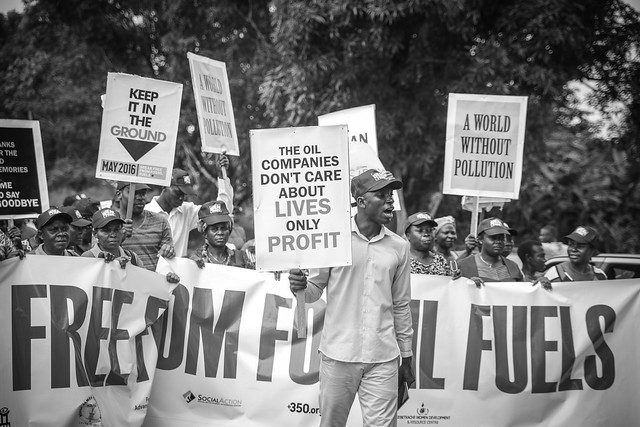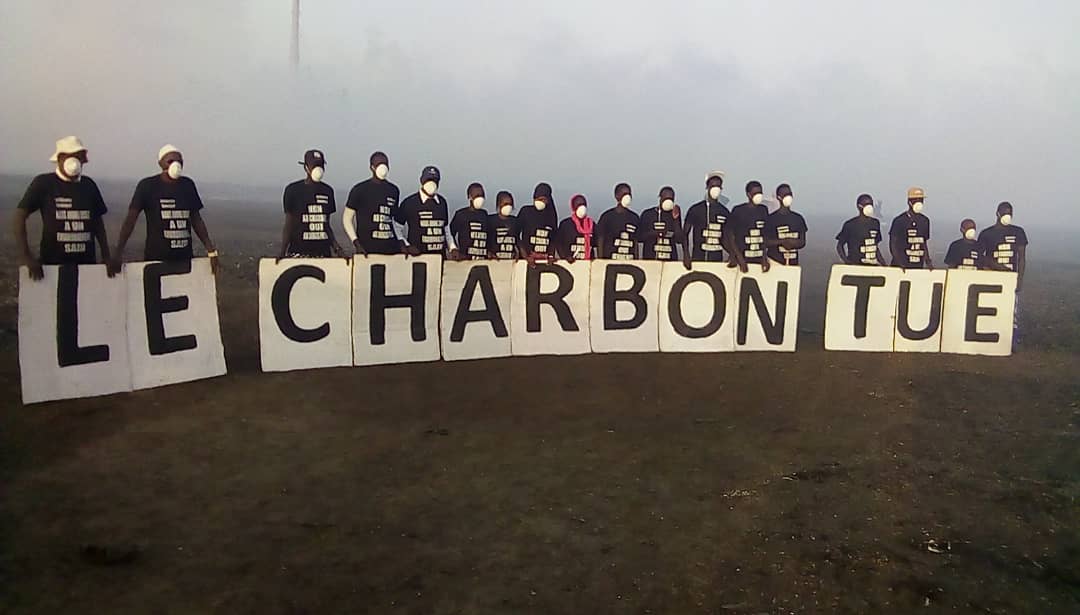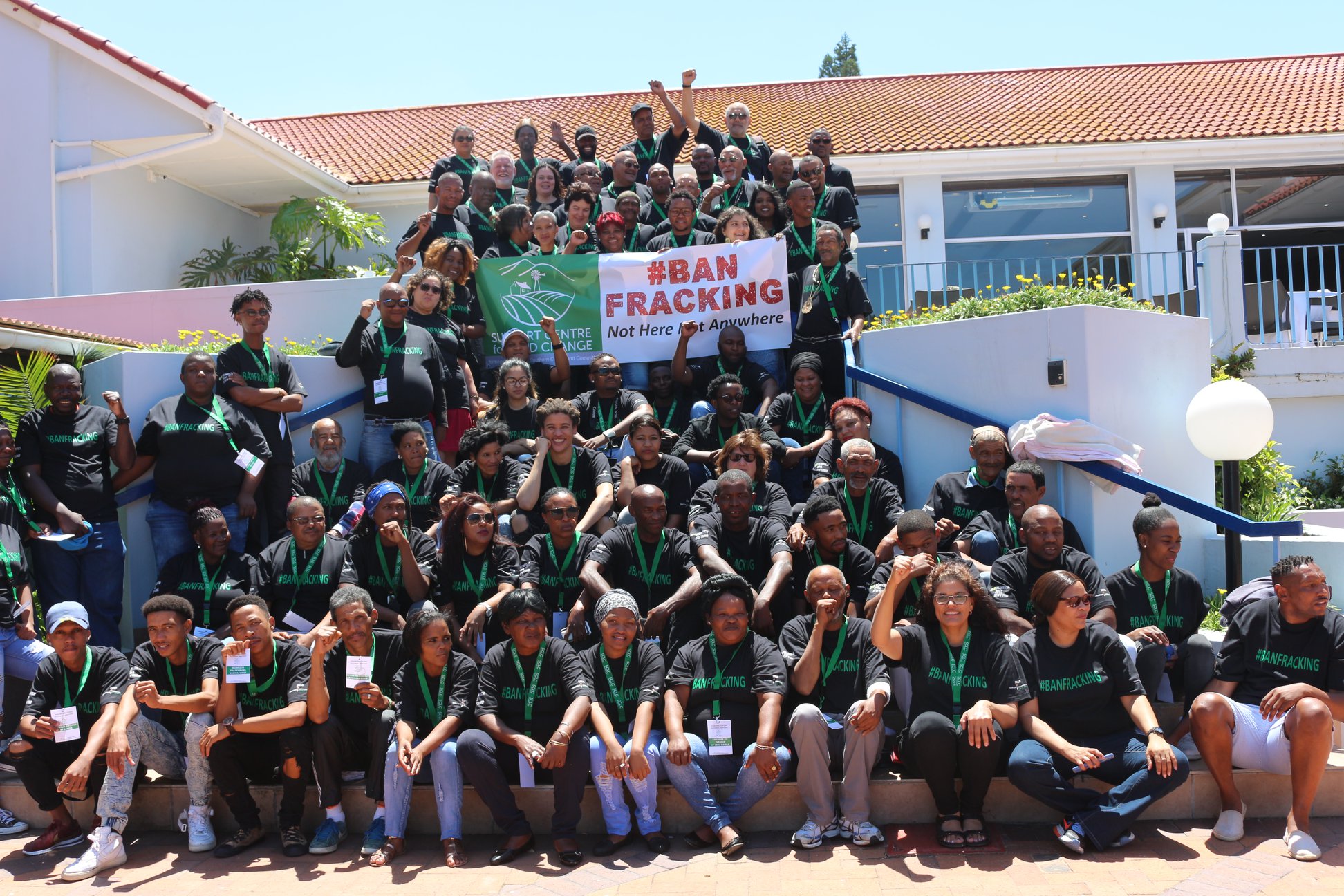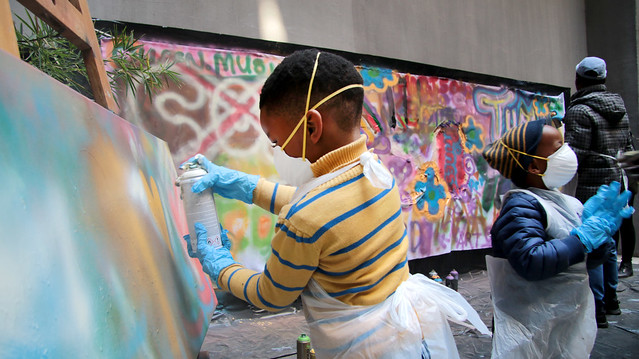We’re days away from rising up calling on our leaders to fight climate change.
We’ve seen throughout history that movements that promote progressive social change have been driven by ordinary people dedicated to leading when governments have failed. People power leading the way has become even more relevant as the effects of climate change have begun to unravel across Africa, as leaders across the length and breadth of the continent prop up the importation and exploitation of fossil fuels.
As part of Africa Day, on May 24-25 we will see the determination of people, in communities across Africa rise up against new fossil fuel exploration, and developments - showing leaders the way to fight climate change. So far there have been over 50 events registered across the continent calling on their leaders to commit to building a fossil free Africa that puts people and justice before profits.
The movement against new fossil fuel developments is global and extremely pertinent to the future of our planet. Here’s a snippet into what will be happening in Nigeria, Senegal and South Africa on the 25th:
- Nigeria: To mark the Afrika Day of Action, GIFSEP intends to mobilize at least 20 Senior Secondary Schools in Abuja to produce and deliver climate-conscious and justice messages on one parachute and other colourful paintings. This parachute and painting will be delivered through a march towards the parliament building asking the members of parliament to pass the climate bill and lead Nigeria on the road to climate justice.
- Senegal: A huge rally gathering at least 1500 citizens composed of youth, women, traditional chiefs, religious leaders, local authorities, CSOs and NGOs is planned in Bargny to denounce the Bargny coal plant project and to call the Senegalese President to demonstrate a stronger leadership role in fighting against climate change and promote renewables.
- South Africa: Communities affected by mining, and those in support of these communities, will be marching to the Union Buildings in Pretoria. A memorandum calling for a national ban on fracking in South Africa will be handed over to the President and to the Minister of the Department of Mineral Resources.
Our collective futures depends on us being able to seize this moment and work together to pushback against the fossil fuel industry fuelling the climate crisis and for long-lasting and meaningful change.
Video: #ThumaMinaDBSA Petition Delivery Action
On Tuesday 30 April 2019, 350Africa.org along with Earthlife Africa and #ThumaMinaDBSA petition supporters hand-delivered over 8000 names which support the call for the Development Bank of Southern Africa (DBSA) to publically commit to not finance the Thabametsi coal-fired power plant.
The names were handed over to Paul Currie, Chief Investment Officer at the DBSA who sincerely conveyed how the bank assesses infrastructure financing applications. We reiterated that the banks screening policies are too lenient on prospective coal financing and that the DBSA has a duty to ensure that projects the bank finances are in the wider public interest and that they are not funding harmful and risky projects like coal-fired power stations which speed up climate change.
This delivery does not mark the end of the campaign. It is a tipping point as we ramp up efforts to constructively engage the DBSA on initiating climate-friendly policies that reflect a progressive energy transition that both tackles climate change and delivers upon a prosperous low carbon economy in South Africa.
350Africa.org calls on the DBSA to develop a stand-alone fossil fuel strategy that fully excludes coal and integrates climate change strategies across their operations to meeting South Africa’s fair share of keeping warming to 1.5C as communicated by the worlds foremost collection of climate scientists.
While the DBSA through the Green Climate Fund (GCF) facility appears to be taking comprehensive action on climate change and the transition to a low carbon economy, the bank is not moving fast enough to contribute to South Africa's Nationally Determined Contribution (NDC) to keeping warming well below 2C - an NDC which is itself far short of South Africa's fair share of keeping warming to well below 2C never mind 1.5C. To date, the bank's approach to climate change has not been ambitious or clear enough to avoid catastrophic climate impacts.
350Africa.org challenges DBSA to play a stronger role in ensuring that South Africa is doing its fair share in a global effort to slash carbon emissions to net zero by 2050 and ensure that South Africa is not left behind as the country’s peers move forward towards a fossil free future.
Nedbank officially Cuts Ties With Coal
In January 2019, Nedbank announced their clean break away from financing coal-fired power plans by committing to not finance Thabametsi and Khanyisa, which form part of South Africa’s first round of Coal Baseload Independent Power Producer Programme.
This announcement followed a 2018 declaration that the bank will no longer provide project financing for coal fired power stations excluding the Coal IPP’s which they had committed to.
The Coal IPPS have been embroiled in multiple long-standing legal challenges that have delayed financial sign-off and culminated in the expiry of varying proposals by a syndicate of South African banks to finance the coal IPP’s.
It is now official that Nedbank has ‘undertaken not to provide project financing or other forms of asset-specific financing where proceeds would be used to develop new coal-fired power plants’. This is a momentous step in the right direction for South Africa makes Nedbank the first Africa based bank to use their financial might to cut ties with coal and prioritize their expertise on helping to deliver on the transition to a low carbon economy through scaling up on renewable energy investments.
We welcome the banks intentions to ‘make change happen’ and deliver on the diversification of electricity supply. In South Africa coal accounts for 77% of electricity output. However, the country’s coal dependency has come at a heavy price, with Witbank, situated in the country’s coal belt being labelled as one of the worst places in the world for air pollution.
With the country’s slow progress in shifting to cleaner power projects in recent years, it is our hope that Nedbank's commitment accelerates the financial services sectors’ will to initiate reforms that fully exclude fossil fuels from lending and investment policies.
350Africa Welcomes Nedbank’s Clean Break Away From Coal
Following years of portraying themselves as a green bank, Nedbank has demonstrated their willingness to Make Change Happen and address climate risks by withdrawing from financing Thabametsi and Khanyisa, two proposed coal fired power plants that form part of governments Coal Independent Power Producer Program (CIPPP). This announcement follows a 2018 declaration that the bank will no longer provide project financing for coal fired power stations excluding the Coal IPP’s which they had committed to.
The Coal IPPS have been embroiled in multiple long-standing legal challenges that have delayed financial sign off and culminated in the expiry of varying proposals by a syndicate of South African banks to finance the coal IPP’s.
With reports of Standard Bank instructing the Department of Energy (DOE) that they will stop funding the construction of any new coal fired power stations in September 2018, and Nedbank's 2019 announcement, the Development Bank of Southern Africa (DBSA), ABSA and the First Rand Group have not yet been bold enough to renounce their shared commitment even though their respective mandates to finance the coal IPP’s have expired.
In a welcomed move, Nedbank is gearing up to walk their talk by prioritising future energy financing for projects in energy efficiency and renewable energy. This is a move that sees the DBSA - a state owned development finance institution, that is yet to accelerate sustainable socio-economic development, lagging behind commercial banks. It is our hope that the DBSA will soon make a clean break from coal fired power and use its financial prowess to further scale up their investments in renewable energy and climate solutions, together with breaking free from the shackles of coal fired power stations which exacerbate the climate crises.
350Africa, in collaboration with the Life After Coal campaign launched the #ThumaMinaDBSA campaign in March 2018 targeting the DBSA. Referencing president Cyril Ramaphosa’s New Dawn speech, we’re calling on the Development Bank to “lend a hand” in the fight against climate change, and commit to not funding Thabametsi. Please add your voice to the call.
Climate Artivism in Jozi
On the 21st July 2018 we hosted the inaugural Art for Climate Get together, this event was about using art as a medium to spread the message about Climate Change. We enlisted some of the country’s top entertainers and influencers to be part of the event and spread the word about it beforehand.
On the day we started with some Climate Change conversations from our campaigner (Ahmed) who explained to the attendees our current campaigns 350 Africa – #ThumaMina: Heed the call, say no to coal, DBSA and some of the other campaigns we have worked on before heading out for a graffiti workshop headlined by Graffiti South Africa’s Cale Waddacor. This session took 2 hours with Cale taking the 40+ participants through the journey of using graffiti as an activist tool while our influencers and musicians took to the stage and performed for the masses.
We were also treated to the artistry of Stewart as he painted an example of the Rise for Climate image, which gave us an opportunity to introduce the Rise for Climate Art competition to the participants in the hopes of any of them entering and probably coming up with our regional image for Rise. The Art competition runs from the 21st July till the 10th August, link below.
The idea behind hosting such an event/activity was to reach out to new audiences in South Africa, this has been a very difficult task for our team as most of the activities/events we have had in the past have yielded small turnouts. The art and climate get together proved very rewarding and we are looking forward to doing more of these sorts of events. We are now in the process of the absorption plan for the 40+ participants as we find ways of keeping them engaged and becoming permanent parts of the climate movement.
Want to get creative? Pick up a paintbrush, sponge or stencil and join our art competition. Submit your masterpiece here: Rise for Climate Art Competition
Press Release: #MANDELA 100
17 July 2018
Contact: Lerato Ngakane, 350Africa.org Communications Coordinator, +27 81 464 9726, Lerato.Ngakane@350.org
As Mandela turns 100, South Africans call on Ramaphosa to ditch coal and approve modern energy policy to fulfil his legacy
JOHANNESBURG - Today, as former US President Barack Obama delivers the Nelson Mandela Annual Lecture, citizens will gather in front of the Bidvest Wanderers Stadium in Illovo, Johannesburg, to ask President Ramaphosa to improve his climate record by overseeing the immediate release of an updated electricity plan that excludes coal or nuclear power.
Since he took office, President Ramaphosa has created expectations of progressive policy shifts in numerous sectors. However, South Africa’s energy policy is outdated and still heavily reliant on coal as a source of electricity generation, which makes it dramatically out of step with the country’s own commitments to address climate change.
South Africa’s long-awaited update to the 2010 Integrated Resource Plan (IRP) is expected to be submitted to parliament in August setting out the path for the country’s future energy mix. This highly anticipated master plan will be critical to ensuring that South Africa embraces a just energy transition where citizens benefit from new, clean energy technologies that reduce electricity costs, while tackling energy poverty, creating new jobs for those employed in the dying coal industry and the unemployed, and meeting the Paris Agreement target of keeping the world from warming over 2°C, aiming for 1.5°C.
Glen Tyler, South Africa team leader at 350.org said, “South Africa deserves a modern energy policy fit for the future and rooted in justice and access for all. The only way to accomplish that is to stop all coal development projects and set the course for a robust transition to a low-carbon economy powered by 100% renewable energy. While he listens to Obama’s lecture on ‘renewing Mandela’s legacy and promoting active citizenship in a changing world’, President Ramaphosa should ask himself what he wants his own climate legacy to be.”
This September, in the spirit of Nelson Mandela, and in line with president Ramaphosa’s Thuma Mina campaign which calls for active citizenship to alleviate South Africa’s challenges, South Africans will #RiseforClimate, organising and pushing for the government in power to recommit to the Paris Agreement by approving a new IRP that promotes renewable energy and progressively ditches coal as a polluting thing of the past.
South Africans will not be alone. People across the world will mobilise on the 8th of September, ahead of the Global Climate Action Summit in California, to demand that local leaders build a fossil free world that works for everyone. Hundreds of events will take place all over the globe to put pressure on leaders for a fast and just transition from fossil fuels to renewable energy. The full range of events can be seen at www.riseforclimate.org.
NOTES FOR THE EDITOR
On 12-14 September 2018 the Governor of California, Jerry Brown will host The Global Climate Action Summit in California, Los Angeles. Its goal is to demonstrate how the tide has turned in the race against climate change, showcase climate action taking place around the world, and inspire deeper commitments from each other and from national governments. It will be the largest gathering of its kind, where leaders from around the world from across sectors will come together to make bold commitments - from mayors & local governments to business and civil society. The global mobilisation will ultimately strengthen the message to national governments that the energy transition is necessary and achievable and that they should follow suit later this year at COP24 by committing to revise their national climate plans by 2020.
#RiseforClimate
Break Free 2018 - Here's What Happened!
On Friday, people across Africa stepped up their commitment to keeping fossil fuels in the ground with courageous actions that have challenged business as usual across Africa.
Click here to see photos from Break Free actions that happened on Friday!
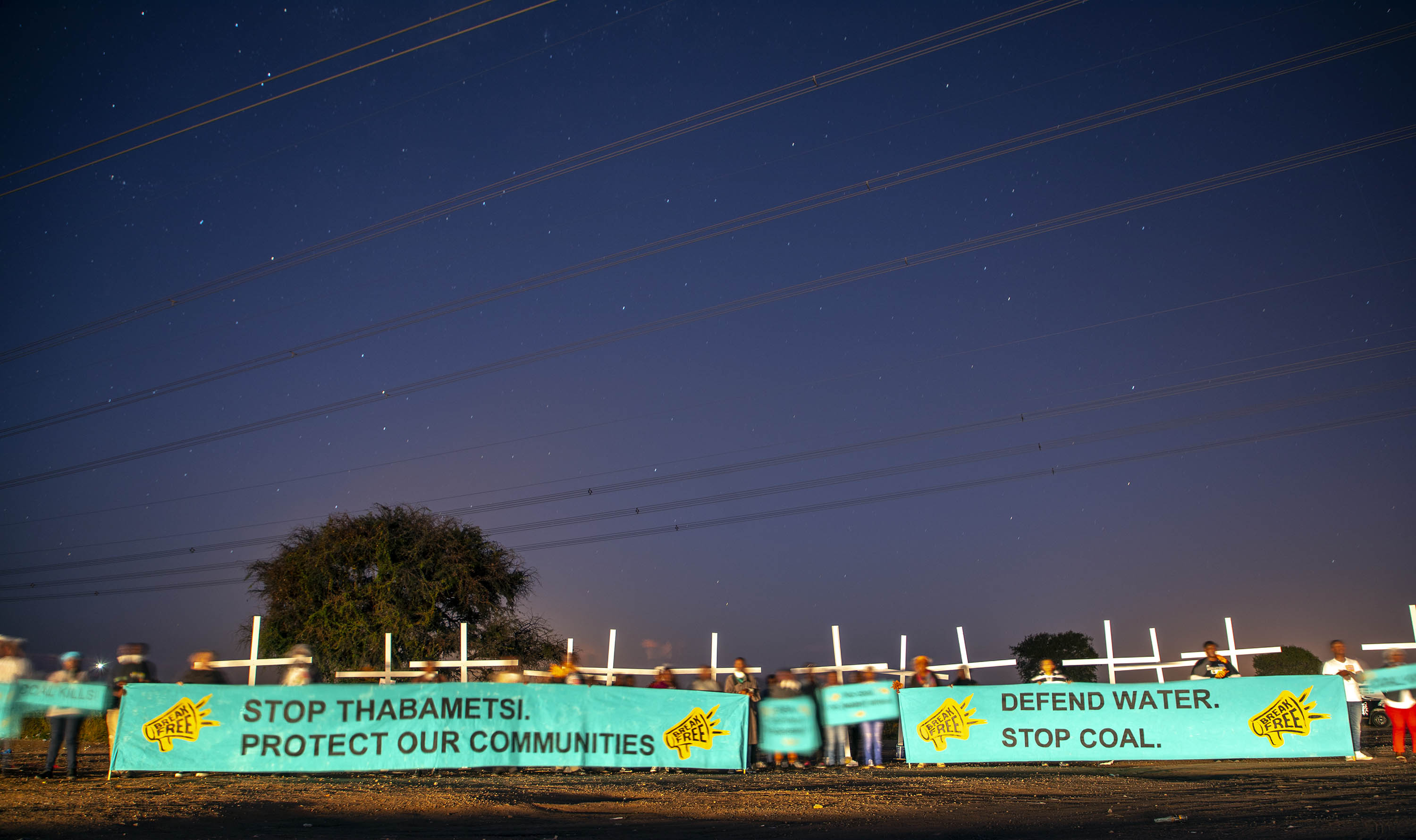
Break Free stood up to the proposed coal-fired station in Lamu, Kenya - told the Development Bank of Southern Africa to not fund Thabametsi, or any more coal projects in South Africa - reached out to communities in the Eastern region of Ghana (Dome, Asayansu, Kwesi Kunde, Fori) to promote and distribute renewable energy solutions.
#Breakfree Press Conference in Abuja Made Headlines, See one below:
We will not rest untill we #BreakFree from Fossil Fuels and embrace Renewable Energy for the good of all of us. @350Africa @AfricaCRP @ninteretse @GlenTyler @groundWorkSA @Rukiya_Khamis https://t.co/LprVpyiwgb— David Mike Terungwa (@miketerungwa) May 27, 2018
With powerful actions involving people across the continent, Break Free from Fossil Fuels took the fight directly to the fossil fuel industry and showed just how powerful we can be when we act together.
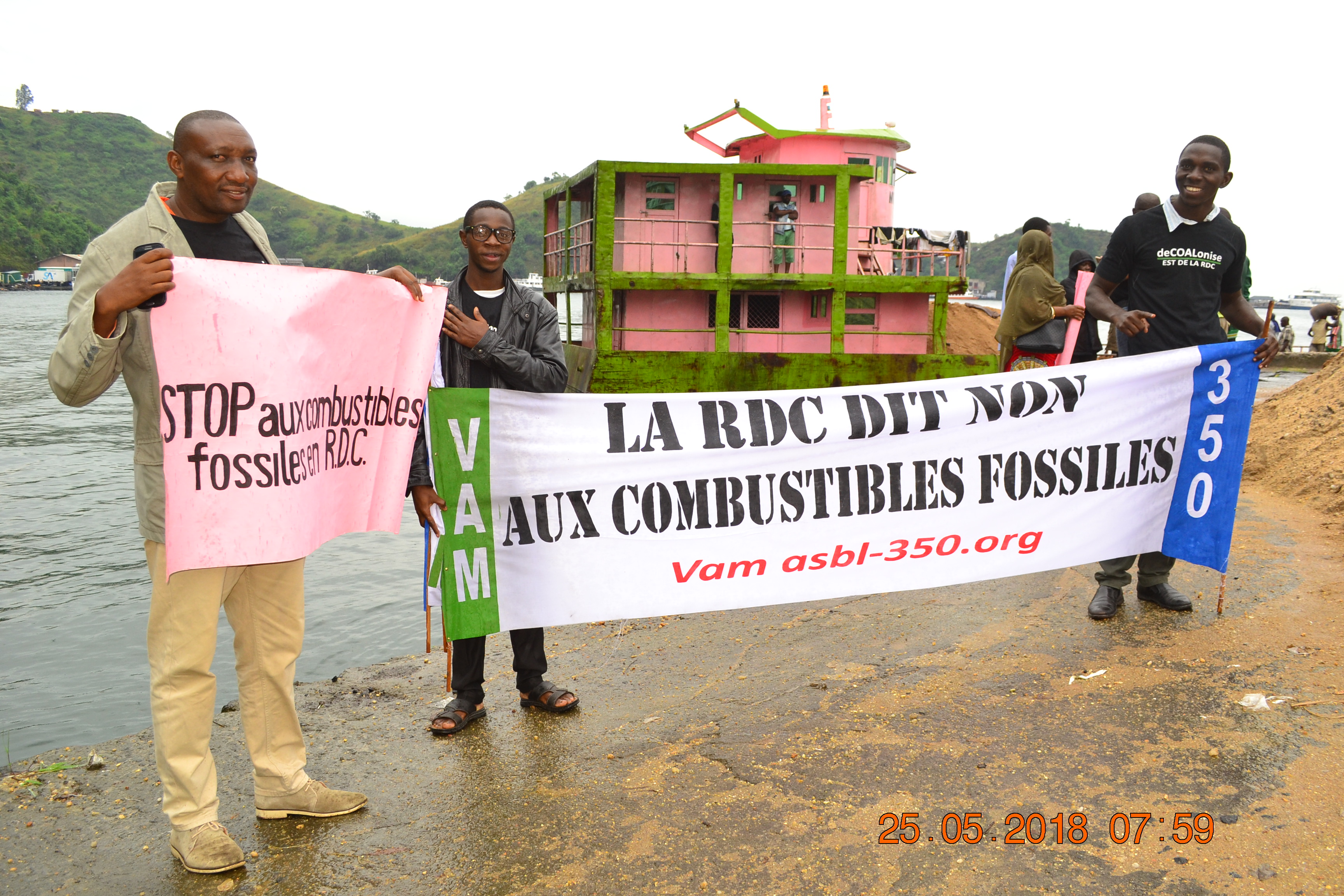
The only way we’ll defeat the fossil fuel industry, which is wrecking our climate is if we all come together to show it up for what it is: an immoral and dangerous industry that is at odds with a safe future.
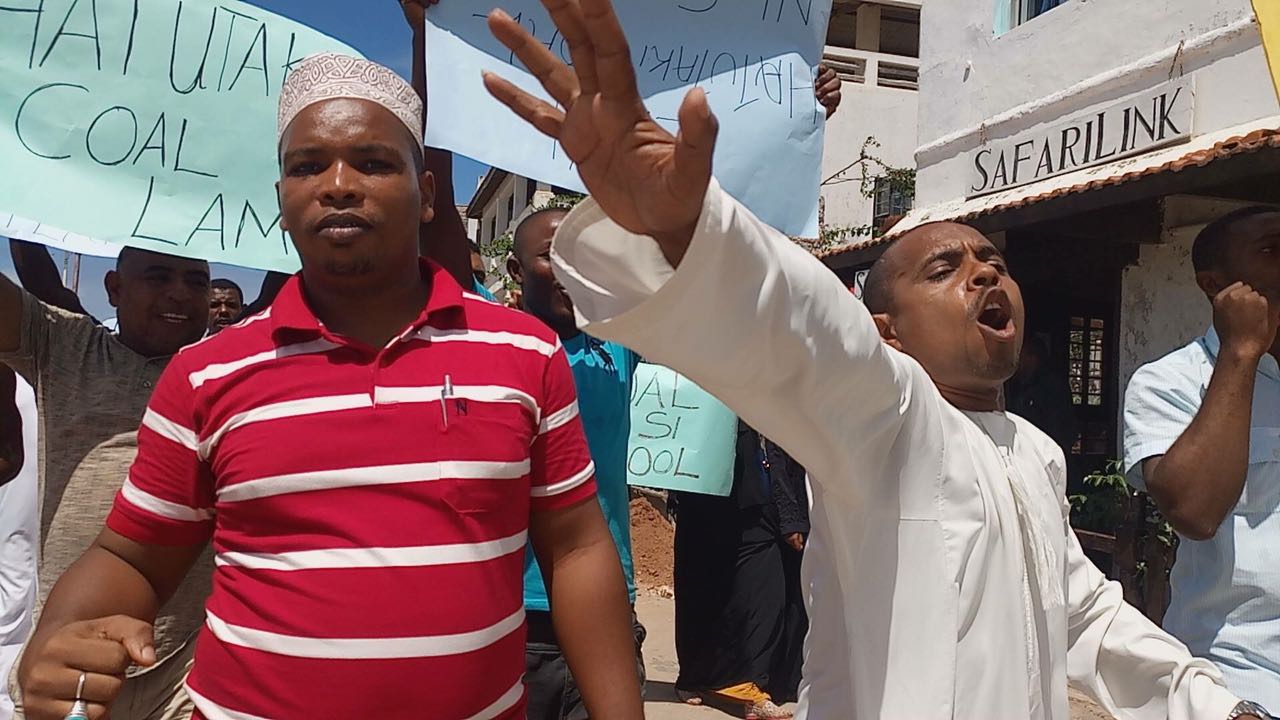
As the planet becomes dangerously hot, our greatest collective hope is that this movement continues to grow in size, strength and boldness. Friday showed what we can accomplish together.
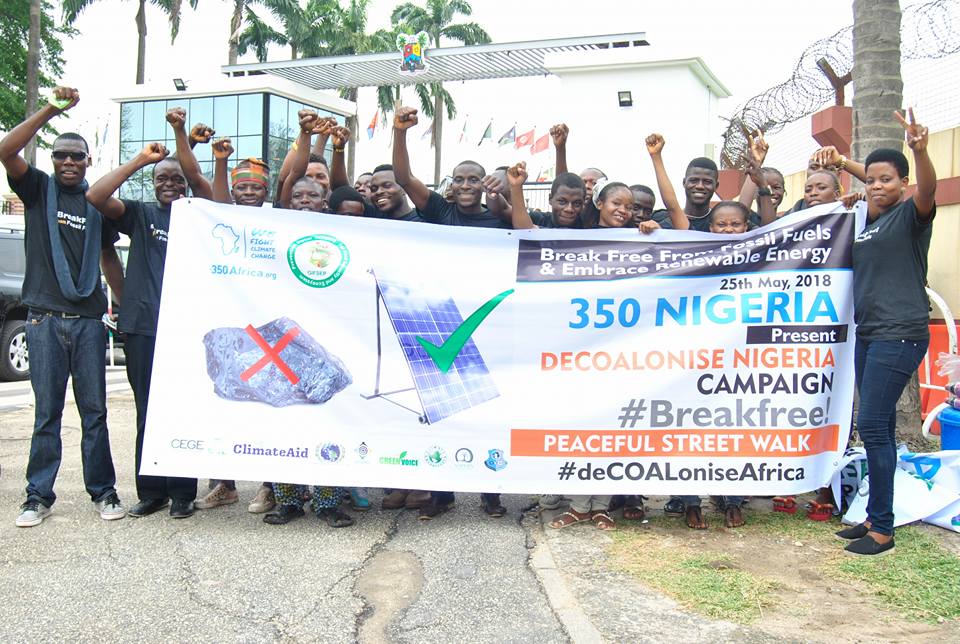
In every country that took action on Friday -- Cote D’Ivoire, South Africa, Nigeria, Egypt, Zambia, Senegal, Kenya, Togo, Uganda, Ghana -- organising against fossil fuels and for renewable energy will continue, stronger than ever.
Children are the future of tomorrow, let us habit train them to #breakfree and go for #fossilfree. Children in Kenya are saying #CoalSiCool @350_kenya @350Africa @ninteretse @deCOALonize @LamuYouthAllia1 @savelamu #deCOALonize pic.twitter.com/OjlAb902pj
— BintiKhamis (@Rukiya_Khamis) May 25, 2018
Because people everywhere see the writing on the wall: the planet is heating up, renewable energy is becoming more affordable, and the fossil fuel industry is entering a financial crisis, the time has come to stand up to its power and pollution.
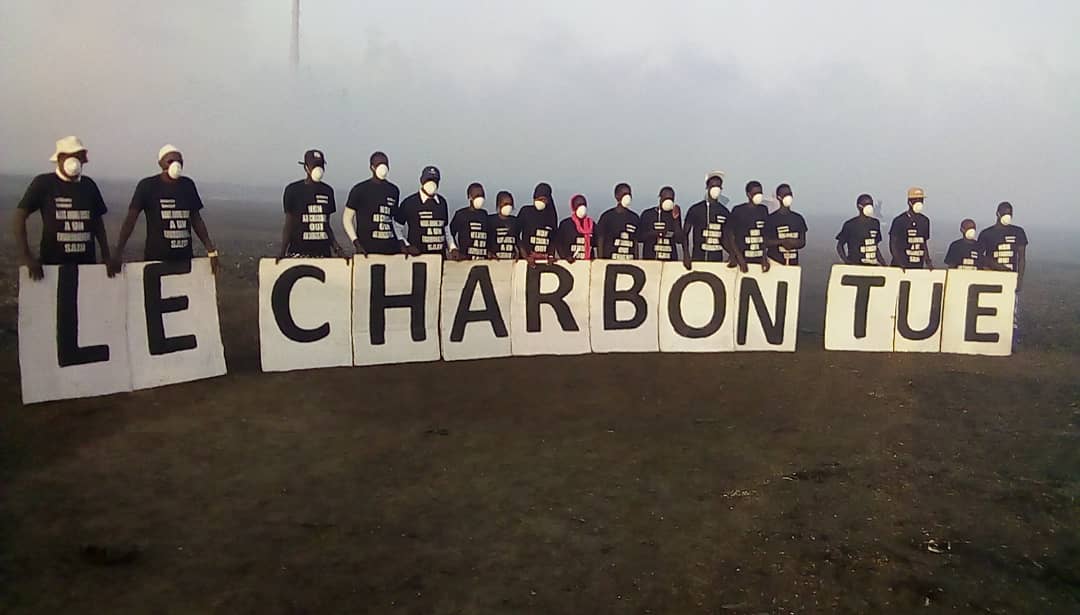
This movement will continue to grow in all of its forms: divesting from fossil fuels, blocking fossil fuel extraction and transportation, passing fracking bans, stopping new coal plants, ending fossil fuel subsidies, and securing commitments build a 100% renewable economy.
in case you missed us ,#GreenEnergy is the future.#breakfree #fossilfuel #FossilFriday #fossilfree #ClimateChange pic.twitter.com/9pw4wjvn9k
— Asmaa Hanafi (@AsmaaHanafi1) May 27, 2018
But our work does not end here. The need for a rapid transition to renewable energy has never been more urgent, and the way we get there is by continuing to organise, mobilise and campaign.
This how we did it in Lagos Nigeria. Happy that African Youths are Championing this course- We must #BreakFree from Dirty Energy. @350Africa @AfricaCRP @gifsep4climate @ninteretse @GlenTyler @Rukiya_Khamis pic.twitter.com/BJJVFp9bch
— David Mike Terungwa (@miketerungwa) May 26, 2018
Even though Break Free 2018 is now over, you can get involved in climate campaigns and mobilisations by signing up to the deCOALonise.africa platform mailing list, or getting involved in the global mobilisation, Rise for Climate.
2018 is a crucial year in fighting for a Fossil Free Africa!
Across Africa, local groups are fiercely working towards setting Africa free from coal dependency. They are leading the #deCOALonise movement. These struggles deserve recognition, support and solidarity @350Africa pic.twitter.com/Z2fd8McyiW
— Landry Ninteretse (@ninteretse) March 2, 2018
With great admiration for the efforts to freeze fossil fuel energy developments in Africa, we report back from the inaugural deCOALonise.africa meeting of Non-profit Organisations (NPOs) advocating for the end of coal in Africa. On February 1, 2018, more than 15 activists representing regional organisations from across Africa gathered in Johannesburg as part of a series of anti-coal organising and campaign capacity building meetings. In sum, participants were introduced to the deCOALonise.africa platform and shared knowledge, experiences and approaches to advocating for a coal-free Africa. The days' discussions focused on approaches to strengthening African anti-coal solidarity, strengthening capacities for organising, mobilising, and engaging with the media through participant-led storytelling, in addition to putting forward ideas of how we as a collective can engage with upcoming global and regional anti-fossil fuel moments in 2018.
Partage d'expériences et des bonnes pratiques sur la lutte contre le charbon et changement climatiques. Meeting #deCOALonise #SA @centre_durable @350Africa @GcuCsayn @AndreMoliro @350 pic.twitter.com/d5Hdbw3P0j
— HOPELANDCONGO (@HLCasbl) February 1, 2018
The deCOALonise.africa campaign platform aims to unite campaigns and movements working to end the age of coal in Africa. Inspired by campaigners in Kenya, the objective of the platform is to highlight the impact of coal on affected people through strengthening solidarity and providing regional campaigns with tools and resources to scale up their efforts to achieve a coal-free Africa powered by 100% renewable energy.
The day's dialogue was kicked off by Chris Kif, Digital Campaigner at 350 Africa. His presentation on what the platform seeks to achieve, and spotlight on how its already working in Ghana and Kenya was followed by participant stories of their campaigns and discussion on how best organisations that are spread across the continent can work together. After some discussion and suggestions, the Decoal platform was endorsed as a useful tool with clear objectives and a solid vision. The remainder of the day was spent discussing how to implement the organising guidelines into their campaigns and how to energise the platform with opportunities to work together.
This first meeting was both inspirational and full of learning. It was valuable to witness and feel the excitement and energy around deCOALonise.africa, and the possibilities it holds for resisting the importation of dirty energy developments into Africa. We’re all back in our respective countries, cities and communities, but bound by an unyielding commitment to stand up against coal. Going forward, participants will meet virtually on the 1st and 6th of March 2018 to plan for key global and regional moments in 2018 - if you are interested in joining this call, you can sign up here. Join us, and let’s set Africa on a coal-free path through people power!
#ThumaMina – call on the DBSA to publicly commit to not financing new coal
We all know we don't need another coal plant. Besides the immediate impact on the health of people living close to the plant, emissions from coal-fired power plants contribute to climate change. Burning more coal will only lead to more catastrophic climate change, more extreme weather and even more impacts like the drought in the Cape and dangerous storms. Coal is killing us and our planet and it's time we took action to stop it.
South Africa is at the shore of a national water crisis. Corruption within the coal sector threatens the country’s democracy and has been entrenched into the highest levels of governance. Reports on how load shedding was used as a money-making scheme, irregularities within the Water and Sanitation Department and ensuing economic misfortune has reached extreme levels and has South Africans feeling despondent in the midst of a water crisis. In order to avoid the situation becoming any worse, public and private financial institutions need to be persuaded to break ties with the coal sector, which threatens our collective well being.
This is why 350Africa has launched the Thuma Mina(lend a hand) DBSA campaign calling on the DBSA to permanently withdraw from financing Thabametsi. The plant will use outdated technology and as a result will be a coal plant with disproportionate emissions, impacts on human health, water availability, and agricultural productivity in an age when any new coal plant cannot compete economically with renewable energy and is a climate crime. Set to begin operating in 2021 with a lifespan of 45 years, the plant would mean that either South Africa will not be able to meet its climate change obligations, or that the power plant will close early, becoming a stranded asset.
The Life After Coal campaign has made incredible progress towards stopping Thabametsi. We now call on the DBSA to continue their work supporting renewable energy and commit to not funding this new coal power plant. Their slogan is #MakeChangeHappen, let’s do it sustainably.
You can join the call by visiting the campaign website and signing the petition asking the DBSA to commit to not funding coal.


